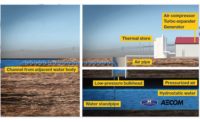
Two energy-industry heavyweights are teaming to expand the Seaway Pipeline to more than double its capacity to transmit crude oil from Canada and the northern U.S. to the Gulf Coast.
Alberta, Canada-based Enbridge Inc. and Houston-based Enterprise Products Partners announced plans on March 26 to collaborate on the more than $2-billion project to expand the existing Seaway Pipeline, which runs from Cushing, Okla., to Freeport, Texas. The firms say they have received enough commitments to add 450,000 barrels per day (bpd) of crude oil to the existing 512-mile pipeline, which currently has a 400,000 bpd capacity. They plan to construct another 500-mile, 30-in.-dia twin line along the route of the existing Seaway Pipeline.
In a separate announcement, Enbridge said it plans to increase the size of the Flanagan South Pipeline–which runs from Flanagan, Ill., to Cushing–to a 36-in.-dia line with a 585,000 bpd capacity. That estimated $2.8-billion project will link to an existing route to Canada, which will give access to U.S. oil producers, allowing them to ship oil produced in the Bakkan shale field south to the Gulf Coast.
Set to be operational by 2014, both pipelines are expected to exceed the capacity of the proposed Keystone XL project, which was blocked by President Barack Obama in January.
The Seaway Pipeline has been jointly operated by Enterprise Products and Enbridge since November 2011. The pipeline routes crude oil north from Texas, but as of June 1, 2012, the flow is scheduled to be reversed south because of a glut of oil in Cushing–a large oil storage hub–thanks to increased crude production in Canada and the northern U.S.
The two projects create a "solution for relieving not only the bottleneck at Cushing but for facilitating the development and delivery of North American energy reserves," Michael Creel, CEO of Enterprise Products, said in a statement.
Energy market analyst Rusty Braziel says that while the projects will temporarily expand capacity, production will catch up, adding constraints and making projects such as Keystone XL necessary.




